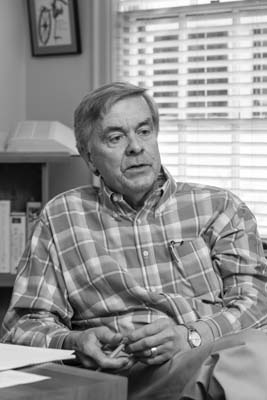Ken Sullivan
Vandalia Award Recipient
By John Lilly

Ken Sullivan, executive director of the West Virginia Humanities Council, 2015.
Photograph by Michael Keller.
Ken Sullivan thought he would be a history professor. That is in fact how he began his professional career. Life had other plans for this son of the Appalachian coalfields. After only two years in academia, Ken became editor of GOLDENSEAL magazine—a position he held for 18 years—then executive director of the West Virginia Humanities Council for the last 18 years. An astute scholar of regional studies and mountain literature, Ken has contributed much to the appreciation and documentation of West Virginia’s folk culture. He deservedly received the 2015 Vandalia Award, West Virginia’s highest folklife honor.
Born in 1949 in southwest Virginia, Ken’s mother was an avid reader, and Ken took an early liking to books as well. “I was always a reader—big reader,” Ken says. “My mom was a reader, I was fortunate to have several teachers in school that encouraged that. While I was definitely soft on the science and math side, I was reading everything I could find in high school.
“I grew up in what I am sure is one of the absolute worst school systems in the country,” Ken says, reflecting on his first taste of formal education. “I don’t think there is any doubt that the central Appalachian counties, including the counties in which I went to school, had inadequate education. But there always were people around, certain teachers that I recall, who worked with kids. While most children coming out of those schools probably were inadequately educated, there always was a sizable minority who went on to college. There was something in that experience that inclined me to go to college.”
Intrigued by jobs he had held in construction, Ken applied and was accepted into the engineering program at the University of Virginia at Charlottesville.
“That was a big mistake!” Ken concedes. “My first semester in engineering school, I had four F’s: engineering, calculus, chemistry, and physics. They had a course in engineering school called humanities, and I got an A in it. I saw the light!” He switched his major to history and graduated with honors in four years. He went on to receive a master’s degree in history from the University of Rochester and a doctorate in history from the University of Pittsburgh. While working on his dissertation about the coal industry in southern West Virginia, Ken took a job teaching history at Antioch University’s Appalachian Center in Beckley.
“It was just like being thrown into the briar patch for me,” Ken says. “I had an opportunity to teach history at the college level right in the very area of my professional interest. It was 1976—I remember because the fire hydrants were all painted up as little colonial soldiers!”
During this time, Ken contributed to GOLDENSEAL and had, ironically, applied and been turned down for a job as GOLDENSEAL assistant editor. The West Virginia Labor Department was looking for a researcher at this same time, and Ken moved to Charleston and accepted the job with the Labor Management Advisory Committee (LMAC). He worked there less than a year before he was hired to replace founding editor Tom Screven at GOLDENSEAL in 1979.
“I was turned down for assistant editor and hired within a year as editor,” Ken recalls with a smile.
You can read the rest of this article in this issue of Goldenseal, available in bookstores, libraries or direct from Goldenseal.